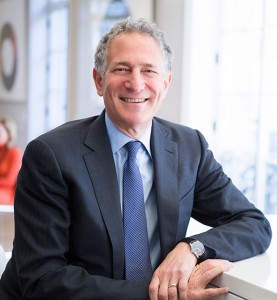It’s not a stretch to call Dan Doctoroff a modern-day Robert Moses. Doctoroff — who started his career at Lehman Brothers and later was a managing partner at private equity firm Oak Hill Capital Partners — joined Mayor Michael Bloomberg’s administration in 2001. As deputy mayor for economic development, he spearheaded the rezoning of large swaths of the city. The results can be seen in today’s buzzing development climate. In 2007, he left City Hall to head up Bloomberg LP, acting as a steward for his longtime boss who founded the media behemoth. Doctoroff, who announced his resignation from Bloomberg in September, is now weighing his next move. While focused on raising money to fight ALS, which claimed his father’s life, he still has a foot in real estate. In November, he called for a new convention center at Queens’ Sunnyside Yards. He’s also the chairman of Culture Shed, a performing arts center at Related Companies’ Hudson Yards, which is set to start construction in the late summer.
Name: Daniel Louis Doctoroff
Born: July 11, 1958
Hometown: Detroit
Marital status: Married
Children: Three
Where were you born and raised?
I was born in Newark, N.J. My father was an FBI agent. I think he spied on Chinese communists and captured bank robbers. He left the FBI when I was two and we moved to Michigan. He became a lawyer and a judge. I grew up in the suburbs of Detroit.
And your mom?
She taught school and later got a PhD in psychology.
Did she ever try to psychoanalyze you?
All the time.
What were you like as kid?
I probably was a classic older brother [to three younger brothers], a little bossy, very conscientious.
You graduated from Harvard, where you met your wife. What was your career objective back then?
There never was a plan. If we had any expectations, it was that we’d have a nice, upper-middle-class life.
How did you end up in New York?
My wife took a job here and I dutifully followed. I had been to New York three times. I thought it was dirty, too busy and noisy. I felt insignificant and I hated it.
How did you end up in business?
It was an accident. I had a summer job during law school. Our law firm represented a company that was the subject of a hostile takeover. I saw the financial analysis that the investment bankers did, and I just thought it was a lot more interesting than what I was doing.
And you ended up at Lehman Brothers?
They took a chance. The person who interviewed me was Peter Solomon [a former deputy mayor under Ed Koch], who was probably the most important mentor in terms of guiding my career, probably him and Mike Bloomberg.
You’ve been a dogged proponent of having NYC host the Olympics,
despite two failed bids. Why?
The real benefit of hosting the Olympics is not the 17-day festival. Bidding for the Olympics, or actually hosting it, acts as a catalyst to get things done.
Do you still think about the stadium on the Far West Side that never got built?
Every time I look at the pathetic Javits Center I think about it, but that’s over. It’s history.
You just sold your townhouse for $11.25 million. Where do you live now?
We just moved to Central Park West. We lived in a brownstone for almost 20 years.
Would you work for $1 again, like you did at City Hall?
For the right thing. I’ve been really fortunate. I’ve been in a position to make more money than I need. My wife and I give away a fair amount of it. Money will not drive what I do next.
What are your weaknesses?
I have tons of them. At its core, it’s probably impatience. I also love junk food. In the last year I’ve lost 20 pounds. But I could eat hundreds of Tootsie Rolls at one time. It’s gross, but it’s true.
What’s been your toughest personal obstacle?
The most difficult thing I’ve had to deal with is the death of my parents. They both died young and from rare diseases.

Dan Doctoroff (Photo: Erin Patrice O’Brien)
Do you worry about dying young because of that?
Not generically. My dad and my uncle died of ALS, Lou Gehrig’s disease, so there’s clearly a genetic component. That creates a bit of a specter that comes and goes. [However] it’s not like I say, ‘I’ve got to get everything done now because I’m afraid I’m going to die tomorrow.’
What do you do in your spare time?
I’m a pretty avid cyclist. I founded the New York City Triathlon. I did it in 2008 and I thought I was going to die! I’ve [also] been struggling to get good at golf.
Who are your golf buddies?
The guy I play with most is [Related Chairman] Steve Ross. We both belong to a place [in Southampton] called Sebonack [Golf Club]. I would not describe either of us as good.
In City Hall you took heat for your relationship with Ross.
There’s certainly no conflict today, and there never was. We were very, very scrupulous in the way in which we dealt with each other.
Your wife is president of UJA-Federation of New York. Is Judaism a big part
of your life?
We’re pretty observant, though I didn’t grow up that way. I decided before we got married that I would have my bar mitzvah. Unbeknownst to me, my friends and brothers planned my bachelor party for the night before [the bar mitzvah]. There was a fair amount of drinking. [The next day], I’m standing on the bimah and the book I’m reading from starts to get farther and farther away. As the seconds go by, I’m thinking that this is the end of my marriage.
